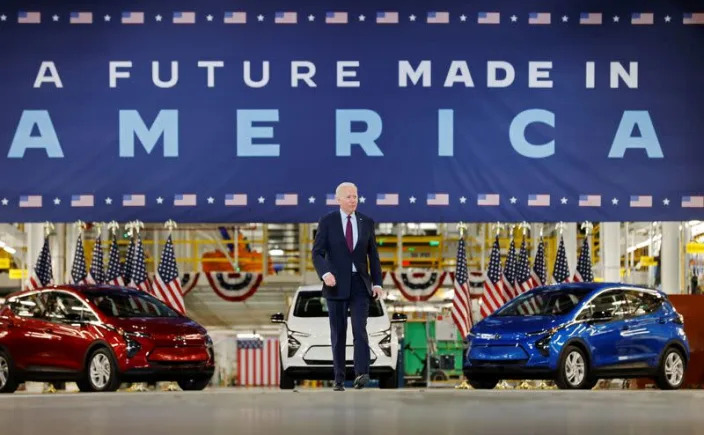
Rebecca Bellan
Tue, August 16, 2022
The Inflation Reduction Act, which President Joe Biden signed into law Tuesday, says that if automakers want their electric vehicles to be eligible for tax credits, they'll need to have final assembly in North America. The law, which takes effect immediately, ends credits for about 70% of the 72 models that were previously eligible, according to the Alliance for Automotive Innovation.
About 20 model year 2022 and early model year 2023 vehicles will still make the cut for EV tax credits of up to $7,500 through the end of the year under the new legislation. Any manufacturer that does not assemble vehicles in North America or has reached their cap of 200,000 EV credits will not be eligible for the freshly named Clean Vehicle Credit this year. That leaves the following models still eligible:
Electric vehicles from model year 2022 eligible for Clean Vehicle Credit
Audi Q5
BMW 3-series Plug-In and BMW X5
Chrysler Pacifica PHEV
Ford F Series; Ford Mustang Mach E; Ford Transit Van
Jeep Grand Cherokee PHEV
Jeep Wrangler PHEV
Lincoln Aviator PHEV and Lincoln Corsair Plug-in
Lucid Air
Nissan Leaf
Rivian EDV; Rivian R1S; Rivian R1T
Volvo S60
Electric vehicles from model year 2023 eligible for Clean Vehicle Credit
BMW 3-series Plug-In
Mercedes EQS
Nissan Leaf
EVs that have used up their tax credits
2022 Chevrolet Bolt EUV; 2022 Chevrolet Bolt EV; 2023 Bolt EV
2022 GMC Hummer Pickup and SUV
2022 Tesla Models 3, S, X and Y
2023 Cadillac Lyriq
More details
The law's signing means that EVs sold by Toyota, Hyundai, Porsche, Kia and others will no longer be eligible for the tax credit. However, if a customer has made a non-refundable deposit or down payment of 5% of the total contact price before Biden signed the law, they can still qualify. Many automakers had been urging customers to finalize deals and put down deposits in order squeeze in a few more tax credits.
Additional provisions are expected to go into effect January 1, 2023. For example, there will be new restrictions on battery and mineral sourcing, as well as price and income caps. The start of the year will also reset the clock for General Motors and Tesla to be eligible once again for EV tax credits.
By 2024, buyers will be able to transfer their credits to dealers when purchasing the vehicles to reduce the sale price.
The U.S. Department of Energy noted that some manufacturers produce vehicles in multiple locations. The build location can be confirmed by referring to a vehicle's Vehicle Identification Number by using the VIN decoder tool.
Winners, losers abound as Inflation Reduction Act becomes law
Japan auto lobby says it is concerned about new U.S. law on EV credits

U.S. President Joe Biden delivers remarks after touring the General Motors 'Factory ZERO' electric vehicle assembly plant in Detroit
Wed, August 17, 2022
TOKYO (Reuters) - A major Japanese auto lobby said it was concerned about a new U.S. law that restricts tax credits for electric vehicles to those assembled in North America.
The Biden administration said on Tuesday about 20 models still qualify for tax credits of up to $7,500. Credits end immediately for about 70% of the 72 models that were previously eligible, according to the Alliance for Automotive Innovation, an industry trade group.
New restrictions on battery and mineral sourcing and price and income caps take effect on Jan. 1 that will make all or nearly all EVs ineligible, the auto group added.
Some major Asian automakers such as Toyota Motor Corp and Hyundai Motor Co do not currently manufacture electric vehicles in the United States.
"We will keep a close watch on future developments and will consult and consider how to respond to them in cooperation with the government," a Japan Automobile Manufacturers Association spokesperson said.
Toyota referred inquiries to the Alliance for Automotive Innovation, which said the auto industry will continue to work with the U.S. government to promote EV tax credits.
Hyundai declined to comment.
(Reporting by Satoshi Sugiyama in Tokyo and Heekyong Yang in Seoul; Editing by Edwina Gibbs)

U.S. President Joe Biden delivers remarks after touring the General Motors 'Factory ZERO' electric vehicle assembly plant in Detroit
Wed, August 17, 2022
TOKYO (Reuters) - A major Japanese auto lobby said it was concerned about a new U.S. law that restricts tax credits for electric vehicles to those assembled in North America.
The Biden administration said on Tuesday about 20 models still qualify for tax credits of up to $7,500. Credits end immediately for about 70% of the 72 models that were previously eligible, according to the Alliance for Automotive Innovation, an industry trade group.
New restrictions on battery and mineral sourcing and price and income caps take effect on Jan. 1 that will make all or nearly all EVs ineligible, the auto group added.
Some major Asian automakers such as Toyota Motor Corp and Hyundai Motor Co do not currently manufacture electric vehicles in the United States.
"We will keep a close watch on future developments and will consult and consider how to respond to them in cooperation with the government," a Japan Automobile Manufacturers Association spokesperson said.
Toyota referred inquiries to the Alliance for Automotive Innovation, which said the auto industry will continue to work with the U.S. government to promote EV tax credits.
Hyundai declined to comment.
(Reporting by Satoshi Sugiyama in Tokyo and Heekyong Yang in Seoul; Editing by Edwina Gibbs)
No comments:
Post a Comment